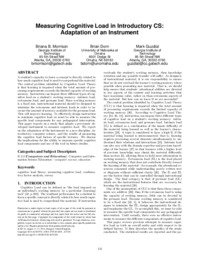Measuring cognitive load in introductory CSadaptation of an instrument
Publikationsdatum:
Zu finden in: ICER 2014 (Seite 131 bis 138), 2014
|
 |
 Diese Seite wurde seit 2 Jahren inhaltlich nicht mehr aktualisiert.
Unter Umständen ist sie nicht mehr aktuell.
Diese Seite wurde seit 2 Jahren inhaltlich nicht mehr aktualisiert.
Unter Umständen ist sie nicht mehr aktuell.
 Zusammenfassungen
Zusammenfassungen

A student's capacity to learn a concept is directly related to how much cognitive load is used to comprehend the material. The central problem identified by Cognitive Load Theory is that learning is impaired when the total amount of processing requirements exceeds the limited capacity of working memory. Instruction can impose three different types of cognitive load on a student's working memory: intrinsic load, extraneous load, and germane load. Since working memory is a fixed size, instructional material should be designed to minimize the extraneous and intrinsic loads in order to increase the amount of memory available for the germane load. This will improve learning. To effectively design instruction to minimize cognitive load we must be able to measure the specific load components for any pedagogical intervention. This paper reports on a study that adapts a previously developed instrument to measure cognitive load. We report on the adaptation of the instrument to a new discipline, introductory computer science, and the results of measuring the cognitive load factors of specific lectures. We discuss the implications for the ability to measure specific cognitive load components and use of the tool in future studies.
 Dieses Konferenz-Paper erwähnt ...
Dieses Konferenz-Paper erwähnt ...
 Begriffe KB IB clear | cognitive load theory (CLT)
, Gedächtnismemory
, Informatikcomputer science
, Kurzzeitgedächtnisshort-term memory
,  Lernen Lernen learning learning
|
 Dieses Konferenz-Paper erwähnt vermutlich nicht ...
Dieses Konferenz-Paper erwähnt vermutlich nicht ... 
 Nicht erwähnte Begriffe | Informatik-Didaktik, Informatik-Unterricht (Fachinformatik), Langzeitgedächtnis, Ultra-Kurzzeitgedächtnis |
 Tagcloud
Tagcloud
 Zitationsgraph
Zitationsgraph
 Zitationsgraph (Beta-Test mit vis.js)
Zitationsgraph (Beta-Test mit vis.js)
 6 Erwähnungen
6 Erwähnungen 
- ICER 2016 - Proceedings of the 2016 ACM Conference on International Computing Education Research, ICER 2016, Melbourne, VIC, Australia, September 8-12, 2016 (Judy Sheard, Josh Tenenberg, Donald Chinn, Brian Dorn) (2016)
- Distractors in Parsons Problems Decrease Learning Efficiency for Young Novice Programmers (Kyle James Harms, Jason Chen, Caitlin Kelleher) (2016)


- Distractors in Parsons Problems Decrease Learning Efficiency for Young Novice Programmers (Kyle James Harms, Jason Chen, Caitlin Kelleher) (2016)
- ICER 2018 - Proceedings of the 2018 ACM Conference on International Computing Education Research, ICER 2018, Espoo, Finland, August 13-15, 2018 (Lauri Malmi, Ari Korhonen, Robert McCartney, Andrew Petersen) (2018)
- Towards an Analysis of Program Complexity From a Cognitive Perspective (Rodrigo Duran, Juha Sorva, Sofia Leite) (2018)


- Towards an Analysis of Program Complexity From a Cognitive Perspective (Rodrigo Duran, Juha Sorva, Sofia Leite) (2018)
- The Cambridge Handbook of Computing Education Research (Sally Fincher, Anthony V. Robins) (2019)

- ICER 2019 - Proceedings of the 2019 ACM Conference on International Computing Education Research, ICER 2019, Toronto, ON, Canada, August 12-14, 2019 (Robert McCartney, Andrew Petersen, Anthony V. Robins, Adon Moskal) (2019)
- Computing Education Theories - What Are They and How Are They Used? (Lauri Malmi, Judy Sheard, Päivi Kinnunen, Simon, Jane Sinclair) (2019)


- Computing Education Theories - What Are They and How Are They Used? (Lauri Malmi, Judy Sheard, Päivi Kinnunen, Simon, Jane Sinclair) (2019)
- ICER 2020 - International Computing Education Research Conference, Virtual Event, New Zealand, August 10-12, 2020 (Anthony V. Robins, Adon Moskal, Amy J. Ko, Renée McCauley) (2020)
- Programming Versus Natural Language - On the Effect of Context on Typing in CS1 (John Edwards, Juho Leinonen 0001, Chetan Birthare, Albina Zavgorodniaia, Arto Hellas) (2020)


- Programming Versus Natural Language - On the Effect of Context on Typing in CS1 (John Edwards, Juho Leinonen 0001, Chetan Birthare, Albina Zavgorodniaia, Arto Hellas) (2020)
- Past, Present and Future of Computing Education Research (Mikko Apiola, Sonsoles López-Pernas, Mohammed Saqr) (2023)


- What is Computing Education Research (CER)? (Mats Daniels, Lauri Malmi, Arnold Pears, Simon)


- What is Computing Education Research (CER)? (Mats Daniels, Lauri Malmi, Arnold Pears, Simon)
 Anderswo finden
Anderswo finden
 Volltext dieses Dokuments
Volltext dieses Dokuments
 |  Measuring cognitive load in introductory CS: Fulltext at the ACM Digital Library ( Measuring cognitive load in introductory CS: Fulltext at the ACM Digital Library ( : :  , 518 kByte; , 518 kByte;  : :  Link unterbrochen? Letzte Überprüfung: 2020-11-28 Letzte erfolgreiche Überprüfung: 2020-08-11) Link unterbrochen? Letzte Überprüfung: 2020-11-28 Letzte erfolgreiche Überprüfung: 2020-08-11) |
 Anderswo suchen
Anderswo suchen 
 Beat und dieses Konferenz-Paper
Beat und dieses Konferenz-Paper
Beat hat Dieses Konferenz-Paper während seiner Zeit am Institut für Medien und Schule (IMS) ins Biblionetz aufgenommen. Beat besitzt kein physisches, aber ein digitales Exemplar. Eine digitale Version ist auf dem Internet verfügbar (s.o.). Aufgrund der wenigen Einträge im Biblionetz scheint er es nicht wirklich gelesen zu haben. Es gibt bisher auch nur wenige Objekte im Biblionetz, die dieses Werk zitieren.










 Biblionetz-History
Biblionetz-History